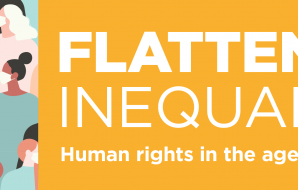Overview
People living with HIV should not face discriminatory or unnecessary barriers to their freedom of movement.
States that erect entry barriers for people with HIV justify their policies as necessary to protect public health and the public purse. But HIV is not communicable through casual contact. Thus, the United Nations has stated that “there is no public health rationale for restricting liberty of movement or choice of residence on the grounds of HIV status.”
We analyze Canadian and international immigration policies and laws, and work with governments and advocacy groups to ensure that those laws respect the human rights of people living with HIV.
Where people living with HIV face persecution in their countries of origin, or where they seek to be reunited with family members, humanitarian concerns and international law should and often do compel countries to admit them.
Learn more:
Submission to the United Nations Human Rights Committee: Review of Canada at 145th Session
The HIV Legal Network made this submission to the United Nations (UN) Human Rights Committee (“Committee”) in advance of its review of Canada’s periodic report, detailing our concerns about Canada’s implementation of the International Covenant on Civil and Political Rights (ICCPR). This submission provides information on violations of Articles 2, 3, 6, 7, 9, and … Read more
Securing Rights – 2024/25 Annual Report
We hope you’ll read our 2024-25 annual report — Securing Rights: Using Our Values to Meet the Moment — to find out more about the kind of positive change we’re making and get a glimpse of what we hope to accomplish in 2026.
Statement on the Federal Court’s Decision Regarding Public Interest Standing in the Medical Inadmissibility Challenge
We are deeply disappointed by the Federal Court’s decision dismissing the HIV Legal Network’s application (“motion”) for public interest standing in the constitutional challenge to Canada’s medical inadmissibility regime. In February 2024, the HIV Legal Network joined RA, an international student living with HIV, in challenging section 38(1)(c) of the Immigration and Refugee Protection Act … Read more
Submission to Standing Committee on Citizenship and Immigration Bill C-12: Strengthening Canada’s Immigration System and Borders Act
Bill C-12 will overhaul how people in Canada can access refugee protection or maintain lawful status by introducing new eligibility bars to refugee protection, broadening government discretion to end refugee claims, granting government sweeping new powers to cancel immigration status, and authorizing increased data-sharing of personal information across government agencies and with foreign governments. Submission … Read more
Open Letter – The Strong Borders Act and its Harm to People Living with HIV and Other Marginalized Communities
June 17, 2025 The Honourable Gary Anandasangaree, P.C., M.P. Minister of Public Safety House of Commons Ottawa, Ontario K1A 0A6 The Honourable Lena Metlege Diab, P.C., M.P. Minister of Immigration, Refugees and Citizenship House of Commons Ottawa, Ontario K1A 0A6 RE: The Strong Borders Act and its Harm to People Living with HIV and Other … Read more
Statement – Challenging the constitutionality of Canada’s “excessive demand” regime in federal court
The HIV Legal Network and a client of Battista Migration Law Group are challenging the constitutionality of Canada’s “excessive demand” regime in federal court. On February 2, 2024, we filed legal arguments and materials challenging the decision of Immigration, Refugees and Citizenship Canada (IRCC) to deny a work permit based on an applicant’s HIV status. … Read more
Media Release – HIV organizations in Canada call for the immediate revocation of immigration policy that harms people living with HIV
This statement can be attributed to HALCO, the HIV Legal Network, and COCQ-SIDA. June 21, 2023 – The HIV & AIDS Legal Clinic Ontario (HALCO), HIV Legal Network, and La Coalition des organismes communautaires québécois de lutte contre le sida (COCQ-SIDA), are deeply concerned about the continued application of the “Automatic Partner Notification Policy” (“the … Read more
HIV organizations in Canada call for the immediate revocation of immigration policy that harms people living with HIV
This statement can be attributed to HALCO, the HIV Legal Network, and COCQ-SIDA. June 21, 2023 – The HIV & AIDS Legal Clinic Ontario (HALCO), HIV Legal Network, and La Coalition des organismes communautaires québécois de lutte contre le sida (COCQ-SIDA), are deeply concerned about the continued application of the “Automatic Partner Notification Policy” (“the … Read more

FLATTEN INEQUALITY: Human rights in the age of COVID-19
In the face of the global COVID-19 pandemic, law- and policymakers are taking and contemplating drastic measures to minimize the spread of the virus. But hasty and broad punitive measures may perversely undermine public health objectives while also violating human rights — so it is essential that any measures be appropriately narrow and comply with … Read more
A Modest Advance on Medical Inadmissability
Today, after years of advocacy by HIV, disability and migrant rights organizations, the Minister of Immigration, Refugees, and Citizenship announced changes to the rules that exclude would-be residents of Canada based on projected “excessive demand” on health and social services. These changes, however, fall far short of the full repeal of the current flawed, discriminatory … Read more

